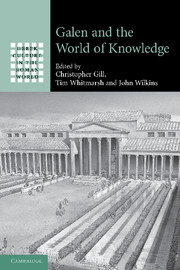Book contents
- Frontmatter
- Contents
- Notes on contributors
- Note on conventions
- Preface
- Introduction
- 1 Galen's library
- 2 Conventions of prefatory self-presentation in Galen's On the Order of My Own Books
- 3 Demiurge and Emperor in Galen's world of knowledge
- 4 Shock and awe: the performance dimension of Galen's anatomy demonstrations
- 5 Galen's un-Hippocratic case-histories
- 6 Staging the past, staging oneself: Galen on Hellenistic exegetical traditions
- 7 Galen and Hippocratic medicine: language and practice
- 8 Galen's Bios and Methodos: from ways of life to path of knowledge
- 9 Does Galen have a medical programme for intellectuals and the faculties of the intellect?
- 10 Galen on the limitations of knowledge
- 11 Galen and Middle Platonism
- 12 ‘Aristotle! What a thing for you to say!’ Galen's engagement with Aristotle and Aristotelians
- 13 Galen and the Stoics, or: the art of not naming
- Bibliography
- Index
13 - Galen and the Stoics, or: the art of not naming
Published online by Cambridge University Press: 06 August 2010
- Frontmatter
- Contents
- Notes on contributors
- Note on conventions
- Preface
- Introduction
- 1 Galen's library
- 2 Conventions of prefatory self-presentation in Galen's On the Order of My Own Books
- 3 Demiurge and Emperor in Galen's world of knowledge
- 4 Shock and awe: the performance dimension of Galen's anatomy demonstrations
- 5 Galen's un-Hippocratic case-histories
- 6 Staging the past, staging oneself: Galen on Hellenistic exegetical traditions
- 7 Galen and Hippocratic medicine: language and practice
- 8 Galen's Bios and Methodos: from ways of life to path of knowledge
- 9 Does Galen have a medical programme for intellectuals and the faculties of the intellect?
- 10 Galen on the limitations of knowledge
- 11 Galen and Middle Platonism
- 12 ‘Aristotle! What a thing for you to say!’ Galen's engagement with Aristotle and Aristotelians
- 13 Galen and the Stoics, or: the art of not naming
- Bibliography
- Index
Summary
AIM AND METHOD
This chapter is entitled ‘Galen and the Stoics’ not ‘Galen and Stoicism’. Its chosen title is intended to convey that it is my purpose to approach Galen's relations with the Stoa as it were from the outside. My main concern will not be with his response to the doctrines of great dead Stoics such as Chrysippus, nor with the conceptual relationship between his system of medicine-cum-philosophy (or parts of it) and Stoicism. Instead I shall be focusing on questions of a different kind. What were Galen's relations with the Stoics of his own day? Who were these Stoics? Further, in addition to Stoic persons, books by Stoics are what interest me: which did Galen know and read? Were there other sources of information on Stoic philosophy on which he drew? Answers to these questions will, I believe, contribute to the study of the presence of Stoicism in Galen's work – a vast subject – and on occasion I shall not refrain from indicating how this may be the case. A few words on the state of scholarly debate may serve to justify this approach.
A quick look at the index of sources in von Arnim's Stoicorum Veterum Fragmenta, still the standard collection of early Stoic fragments, suffices to show that Galen's dealings with Stoicism were extensive and long-standing. Von Arnim was not mistaken about this. The documented evidence is not only extensive but also variegated in nature, ranging from verbatim quotation to unacknowledged borrowing and allusion.
- Type
- Chapter
- Information
- Galen and the World of Knowledge , pp. 282 - 299Publisher: Cambridge University PressPrint publication year: 2009
- 4
- Cited by



